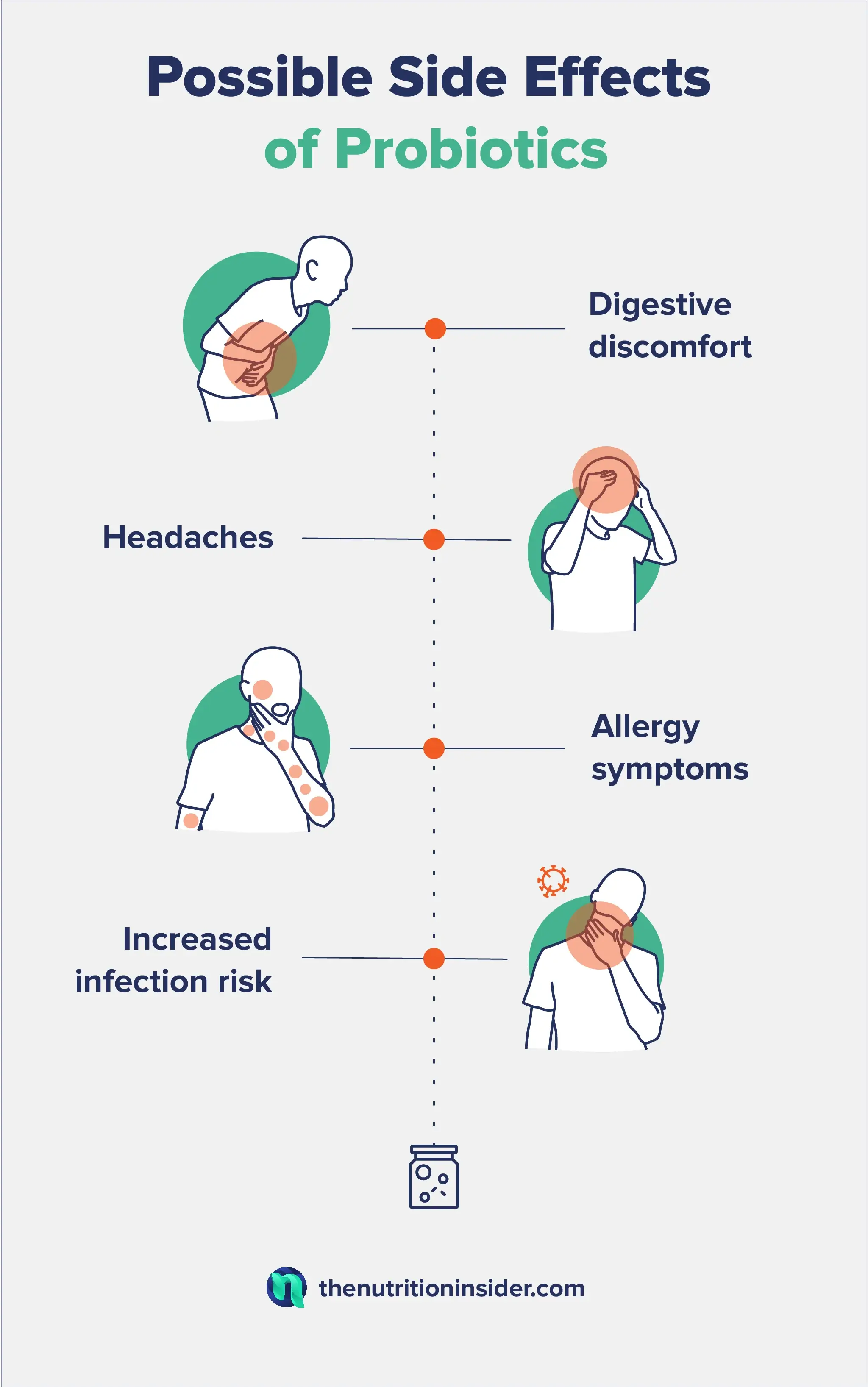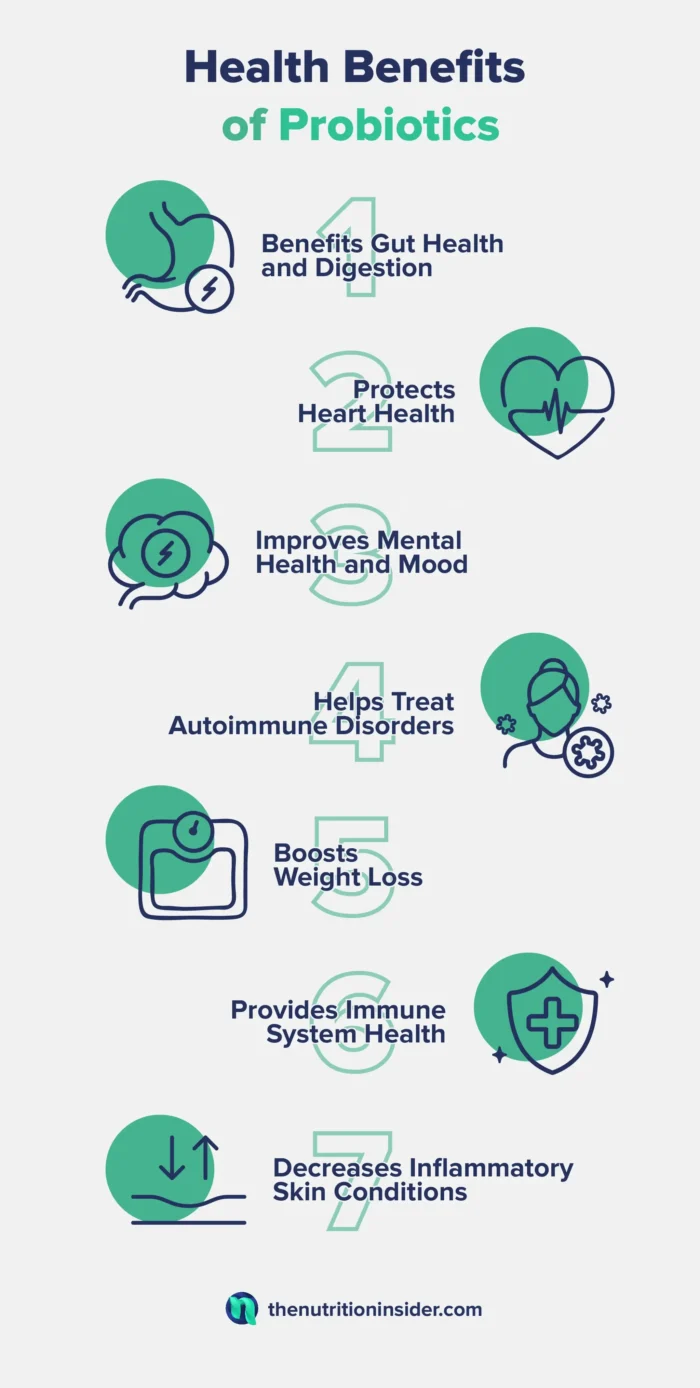Try our favorite, clean protein powder: See our top pick →
Try our favorite, clean protein powder: See our top pick →
This post contains links through which we may earn a small commission should you make a purchase from a brand. This in no way affects our ability to objectively critique the products and brands we review.
Evidence Based Research To fulfill our commitment to bringing our audience accurate and insightful content, our expert writers and medical reviewers rely on carefully curated research.
Read Our Editorial Policy
Probiotics are all the rage—from wellness shots to fizzy drinks to straight-up supplements, healthy bacteria can now be found in just about every aisle of the grocery store.
But are there downsides to poppin’ probiotics like they’re candy? In this article, we’ll dive into the potential side effects of probiotic supplementation, including who should not take them or proceed with caution.
There are not many significant side effects of probiotic supplements for the general population, but some have been reported.

The most common side effects of probiotics are digestive-related, including:
This is a bit ironic, as many people want to take probiotics to improve gut issues—but the potential digestive side effects are typically acute, resolving within a few days to a couple of weeks. Over time, the potential gut health benefits usually outweigh the possible initial discomfort.
To reduce the chances of developing digestive side effects, start with a lower dose (i.e., if it recommends taking two capsules, start with one) or take them every other day for a week or two until the gut starts to “get used to” the additional microorganisms.
These side effects are also more likely if the supplement contains many bacterial strains or a high CFU (colony-forming units) count, so you could look for a probiotic with fewer CFU (say, 1 million) when you start out.
Fermented foods that contain probiotics may cause headaches due to their histamine content—a type of amine compound that excites the central nervous system and alters blood flow.
Amines like histamine may lead to headaches in some sensitive people.
While this is most commonly caused by fermented foods, some probiotic strains found in supplements can also increase histamine levels, as certain bacteria produce histamine inside the digestive tract.
People with histamine intolerance (who cannot break down histamine normally) may experience allergy-like symptoms, including sneezing, runny nose, swelling, or itchy eyes, after consuming probiotics that raise histamine levels. Although there is minimal research in this area, some bacteria that produce histamine include Lactobacillus buchneri, Lactobacillus helveticus, Lactobacillus hilgardii, and Streptococcus thermophilus.
In rare cases, the bacteria (or yeast) found in probiotic supplements can enter the bloodstream and cause serious infections.
The primary risk factor for this is being immunocompromised, as the immune system is less able to respond to and recognize the friendly bacteria appropriately.
The infection risk is higher in those taking immunosuppressing medications, those who are in the hospital or ICU for prolonged stays, those with a venous catheter, and people with acute pancreatitis or recent surgeries.
As mentioned, people who are immunocompromised or take immunosuppressive medications may want to take caution with probiotics and should speak with their doctor first.
Although probiotic microorganisms are beneficial bacteria, people with compromised immune systems may not be able to mount an appropriate response to any microbe they come in contact with, potentially leading to rare but serious infections.
Those at greatest risk for infection from probiotics include people with compromised immune systems, prolonged hospitalizations, venous catheters, severe acute pancreatitis, or those who have undergone recent surgeries.
Lastly, if you have a known allergy or intolerance to an ingredient found in any probiotic supplement, you should, of course, not take it.
Probiotics are live microorganisms that benefit the host (AKA us). Probiotics help to populate the gut microbiome with beneficial bacteria, which, in turn, crowds out pathogenic or harmful microbes. The opposite state of this is dysbiosis—an overgrowth of harmful bacteria and too few good gut bugs.
Microbial diversity is essential because various bacterial species do different things, ranging from digesting fiber to producing vitamins and metabolites to modulating immune system function.
Research shows that dysbiosis is linked to a myriad of health problems—both digestive and non-digestive—including inflammatory bowel disease (IBD), irritable bowel syndrome (IBS), diabetes and metabolic dysfunction, obesity, cancer, and cardiovascular and cognitive disorders.
Some of the best probiotic supplements can be found in these articles: Best Probiotics for Men and Best Probiotics for Women.
Briefly, here are a few of our top favorites for women:
For men looking for a probiotic, try one of these:
Unsurprisingly, the top health benefits of probiotics are related to gut and digestive health—but more and more research is emerging about how probiotic supplements or maintaining a healthy and diverse microbiome can benefit just about every area of the body.
Let’s take a quick look at some of the leading ways that probiotic supplements can benefit health (for a deeper dive into the research, check out this article).

As probiotics can reduce dysbiosis and create a healthy gut microflora, they are thought to improve several digestive-related conditions or symptoms, including:
The gut-heart axis is a newer area of research that studies how the bacteria and metabolites in our digestive tract—both good and bad—can influence our cardiovascular system.
Researchers have found that people with heart disease have different microbiomes than cardiovascularly healthy people, including reductions in metabolites called short-chain fatty acids (SCFAs).
The short-chain fatty acids butyrate, acetate, and propionate are beneficial metabolites produced when fibers are fermented in the gut by healthy bacteria. If you don’t have enough good gut bacteria (or don’t eat enough fiber), you won’t have adequate SCFA activity.
When it comes to heart health, SCFA levels are important because they influence blood pressure, blood sugar control, and lipid metabolism. SCFAs have been shown to lower cholesterol synthesis rates, leading to lower blood cholesterol levels. Two SCFA-producing bacterial genera include Lactobacillus and Bifidobacterium, which are commonly found in probiotic supplements.
Research suggests that probiotic supplements may benefit mental health or mood-related conditions, including depression, anxiety, OCD (obsessive-compulsive disorder), and chronic stress.
Probiotics that affect mental health or cognition are called “psychobiotics,” acting on neurotransmitters produced in the gut (including GABA, serotonin, and glutamate) and involved in mental health conditions or mood.One meta-analysis of 34 clinical trials concluded that taking probiotic supplements led to small but significant effects in reducing symptoms of depression and anxiety.
Some research has suggested that symptoms of autoimmune diseases like rheumatoid arthritis, IBD, multiple sclerosis (MS), and lupus may benefit from supplemental probiotics.
However, as there are more than 100 types of autoimmune diseases, probiotics are not known to benefit all of them.
More research is needed before probiotic use is recommended in people with autoimmune diseases.
It’s also important to note that many autoimmune medications are immunosuppressive, and some probiotic strains might increase the risk of infection in people taking these medications because of their compromised immune systems.
Talk to your doctor if you’re unsure whether or not you should take probiotic supplements with your autoimmune condition.
A diverse gut microbiome filled with beneficial bacteria is linked to healthier body weights, as certain gut microbes are associated with “leanness” and healthy metabolism.
Research has found that taking probiotics can reduce BMI (Body Mass Index), body weight, visceral abdominal fat, waist circumference, and hip circumference. Another review examined the types of bacteria that were beneficial for weight loss, finding that the most effective probiotic strains belonged to the genera Lactobacillus, Bifidobacterium, and Pediococcus, with doses of at least 1 million CFUs for a minimum of four weeks.
Taking probiotics may help your immune system to function better, making you more resilient to getting sick.
Studies have shown that probiotics can modulate both arms of the immune system (innate and adaptive) in older adults and reduce the length of infection in children and adults. Research has also uncovered that taking probiotics can improve immune responses to influenza vaccinations, increasing protection from the flu.
Some skin conditions related to inflammation—like psoriasis, rosacea, eczema/atopic dermatitis, and acne—may be improved by probiotic supplements by acting on the gut-skin axis, although the research is not conclusive.
One small clinical trial found that people with psoriasis who received spore-forming oral probiotics and a topical cream for psoriasis had better skin-related results than those who just used the cream.
Like most skin conditions, the development of acne is multifactorial—but, in many cases, inflammation and damaged intestinal barriers can play a role, which probiotics may be able to improve. While human clinical trials on acne and probiotics are scarce, one small study found that supplementation with the probiotic strain Lactobacillus rhamnosus SP1 led to a 28% improvement in the appearance of adult acne.
Taking too many probiotics—like if you accidentally double up on your supplement dose for the day—is not known to cause any serious adverse effects. The most significant side effect you could expect from taking too many probiotics would be digestive discomfort, like gas or bloating.
If you take a high-quality probiotic supplement every day, you might experience beneficial effects on your digestive system. Some other potential benefits of probiotics include improved immune system function, skin health, mental health, and heart health. However, the results can vary widely depending on the certain bacterial strains you take and what your overall health status is.
Some people might experience digestive discomfort, gas, or bloating when taking probiotics, especially if it has many strains or a high CFU (colony-forming units) count. However, the potential gut health benefits over time typically outweigh the possible discomfort initially. Some other potential minor side effects of taking probiotics include headaches and symptoms of allergic reactions.
People who are immunocompromised or take immunosuppressive medications may want to take caution with probiotics and should speak with their doctor first. Although probiotic microorganisms are beneficial bacteria, people with compromised immune systems may not be able to mount an appropriate response to any microbe they come in contact with, leading to infections. Immunocompromised people can also include people undergoing prolonged hospital stays or surgeries and those with venous catheters. People with severe acute pancreatitis should not take probiotics, as this may increase the risk of death (although this is rare).
Fermented foods are all high in probiotic bacteria, including:
• Sauerkraut
• Kimchi
• Fermented dairy products (like kefir, yogurt, buttermilk, and sour cream)
• “Real” pickles (refrigerated ones)
• Fermented vegetables
• Kombucha
• Tempeh
• “Real” sourdough (does not contain yeast or preservatives)
• Miso
• Natto
Subscribe now and never miss anything about the topics important to you and your health.